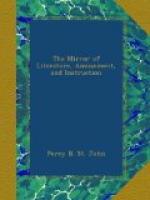* * * * *
STONE-MASON’S CRITICISM
Mr. Bowles, the vicar of Bremhill, Wilts, is accustomed occasionally to write epitaphs for the young and aged dead among his own parishioners. An epitaph of his, on an aged father and mother, written in the character of a most exemplary son—the father living to eighty-seven years—ran thus:—
“My father—my poor mother—both
are gone,
And o’er your cold remains I place
this stone,
In memory of your virtues. May it
tell
How long one parent lived, and
both how well,”
&c.
When this was shown to the stone-mason critic, (and Mr. Bowles acknowledges he has heard worse public critics in his time,) he observed, that the lines might do with a little alteration—thus:—
“My father, and my mother too, are
dead,
And here I put this grave-stone
at their head;
My father lived to eighty-seven, my mother
No quite so long—and
one died after t’other.”
* * * * *
PLEASURES OF HISTORY.
The effect of historical reading is analogous, in many respects to that produced by foreign travel. The student, like the tourist, is transported into a new state of society. He sees new fashions. He hears new modes of expression. His mind enlarged by contemplating the wide diversities of laws, of morals, of manners. But men may travel far, and return with minds as contracted as if they had never retired from their own market-towns. In the same manner, men may know the dates of many battles, and the genealogies of many noble houses, and yet be no wiser. Most people look at past times, as princes look at foreign countries. More than one illustrious stranger has landed on our island amidst the shouts of a mob, has dined with the king, has hunted with the master of the stag-hounds, has seen the guards reviewed, and a Knight of the Garter installed; has cantered along Regent-street; has visited St. Paul’s, and noted down its dimensions, and has then departed, thinking that he has seen England. He has, in fact, seen a few public buildings, public men, and public ceremonies. But of the vast and complex system of society, of the fine shades of national character, of the practical operation of government and laws, he knows nothing.—Edin. Rev.
* * * * *




